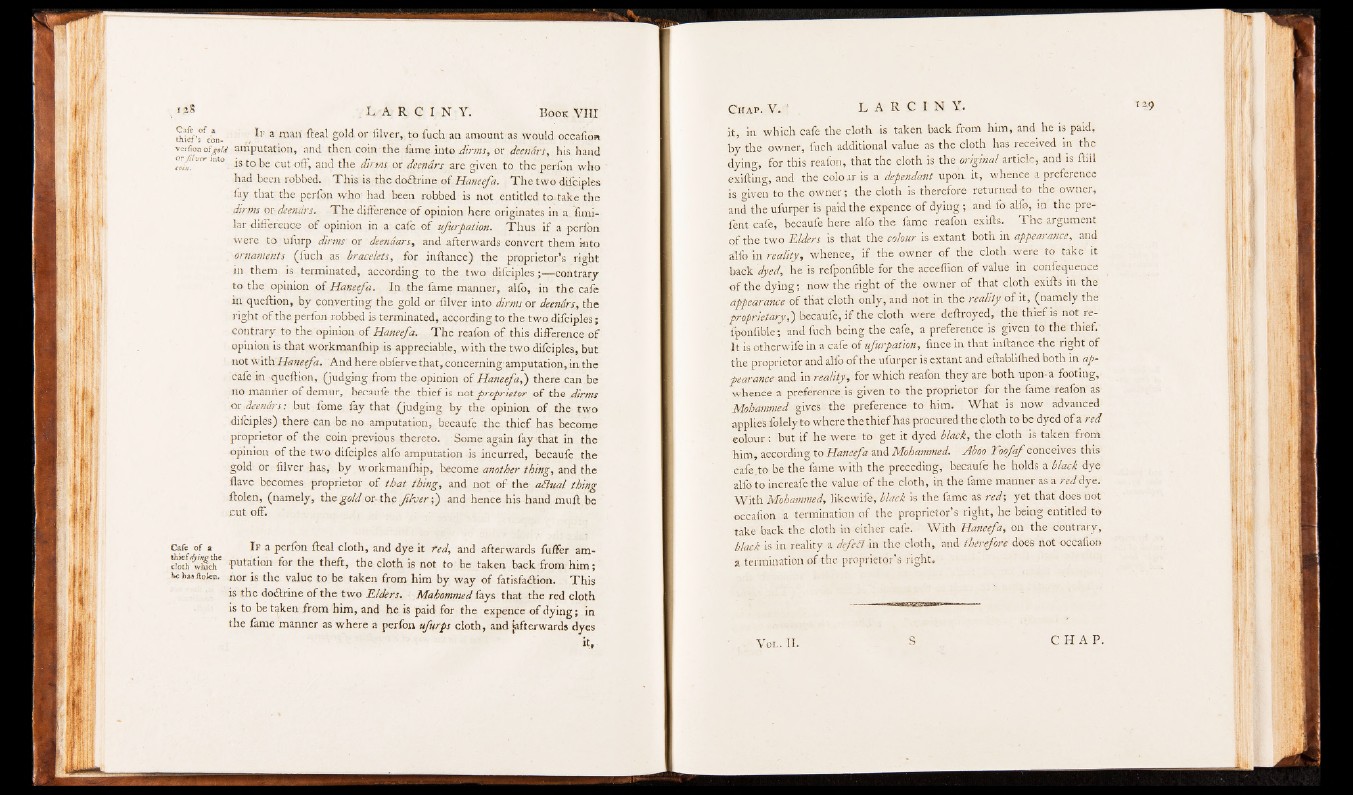
SiefWon- ^ a mart 8°^ or fiver, to fuch an amount as would occafion
vEifion ofgM amputation, and then coin the fame into dirms-, or deendrs,his hand
t , i „ , vcr lnt° is to be cut off, and the dirms or deendrs are given to the perfon who
had been robbed. This is the doctrine of Haneefa. The two difciples
fay that the perfdn who: had been robbed is not entitled to-take the
dirms ox deenars. T h e difference of opinion here originates in a fimi-
lar difference of opinion in a: cafe of ufurpation. Thus if a perfon
were to ufurp dirms ox deendars, and afterwards convert them into
. Ornaments (fuch as bracelets, for inflance) the proprietor’s right
in them is terminated, according to the two. difciples,;— contrary
to the opinion of Haneefa. In the fame manner, alfo, in the cafe
in queftion, by converting the gold or filver into dirms ox deendrs, the
right of the perfon robbed isterminated, according to the two difciples;
contrary to the opinion of Haneefa. The reafbn of this difference of
opinion is that workmanfhip is appreciable, with the two difciples, but
not with Haneefa. And here obferve that, concerningamputation, in the
cafe in queftion, (judging from the opinion of Haneefa,) there can be
no manner of demur, becaufe the thief is not proprietor of the dirms
or deendrs: but fome fay that (judging by the opinion o f the two
difciples) there can be no amputation, becaufe the thief has become
proprietor of the coin previous thereto. Some again fay that in the
opinion of the two difciples alfo amputation is incurred, becaufe the
gold or filver has, by workmanfhip, become another thing, and the
Have becomes proprietor of that thing, and not of the actual thing
ftolen, (namely, the gold or-the fiv e r ;) and hence his hand muft be
cut off.
Cafe of a I f a perfon fteal cloth, and dye it fed, and afterwards fuffer am-
dmb wUchC Potation for the theft, the cloth is not to be taken back from him;
fee has ftolen. nor is the value to be taken from him by way of fatisfaftion. This
is the doftrine of the two Elders. Mahommed fays that the red cloth
is to be taken from him, and he is paid for the expence of dying; in
the fame manner as where a perfon ufurps cloth, and |afterwards dyes
£1
it, in which cafe the cloth is taken back from him, and he is paid,
by the owner, fuch additional value as the cloth has received in the
dyinf, for this reafon, that the cloth is the original article, and is ftill
exifting, and the colour is a dependant upon, it, whence a preference
is o'iven to the owner; the cloth is therefore returned to the owner,
and the ufurper is paid the expence of dying; and fo alfo, in the pre-
fent cafe, becaufe here alfo the lame reafon exifts. T h e argument
of the two Elders is that the colour is extant both in appearance, and
alfo in reality, whence, if the owner of the cloth.were to take it
back dyed, he is refponfible for the acceflion of value in confequence
of the dying ; now the right of the owner of that cloth exifts in the
appearance of that cloth only, and not in the reality of it, (namely thff
proprietary,') becaufe, if the cloth were deftroyed, the thief is* not refponfible;
and fuch being the cafe, a preference is given to the thief.'
It is otherwifo in a cafe of usurpation, fince in that lnftancG the right of
the proprietor and alfo of the ufurper is extant and eftablifhed both in appearance
and in reality, for which reafon they are both upon-a footing,
whence a preference is given to the proprietor for the fame reafon as-
Mohammed gives the preference to him. What is now advanced
applies folely to where the thief has procured the cloth to be dyed o f a red
eolour: but if he were to get it dyed black, the cloth is taken from
him, according, to Haneefa and Mohammed. Aboo Toofaf conceives this
cafe,to be the fame with the preceding, becaufe he holds a black dye
alfo to increafe the value, of the cloth, in the fame manner as a red dye.
With Mohammed, likewife, black is the fame as red-, yet that does not
occafion a termination of the proprietor’ s right, he being entitled to
take back the cloth in either cafe. With Haneefa, on the contrary,
black is in reality a defeht in the cloth, and therefore does not-occafion
a termination of the proprietor’s right.
V ol. II. C H A P .